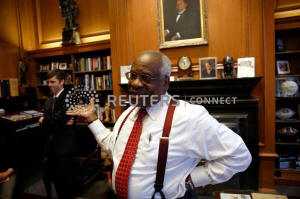|
Justice Thomas urges U.S. Supreme Court
to feel free to reverse precedents
 Send a link to a friend
Send a link to a friend
 [June 18, 2019]
By Jonathan Stempel [June 18, 2019]
By Jonathan Stempel
(Reuters) - Justice Clarence Thomas on
Monday urged the U.S. Supreme Court to feel less bound to upholding
precedent, advancing a view that if adopted by enough of his fellow
justices could result in more past decisions being overruled, perhaps
including the landmark 1973 Roe v. Wade decision that legalized abortion
nationwide.
Writing in a gun possession case over whether the federal government and
states can prosecute someone separately for the same crime, Thomas said
the court should reconsider its standard for reviewing precedents.
Thomas said the nine justices should not uphold precedents that are
"demonstrably erroneous," regardless of whether other factors supported
letting them stand.
"When faced with a demonstrably erroneous precedent, my rule is simple:
We should not follow it," wrote Thomas, who has long expressed a greater
willingness than his colleagues to overrule precedents.

In a concurring opinion, which no other justice joined, Thomas referred
to the court's 1992 decision in Planned Parenthood v. Casey, which
reaffirmed Roe and said states cannot place an undue burden on the
constitutional right to an abortion recognized in the Roe decision.
Thomas, a member of the court at the time, dissented from the Casey
ruling.
Thomas, 70, joined the court in 1991 as an appointee of Republican
President George H.W. Bush. Thomas is its longest-serving current
justice.
The court now has a 5-4 conservative majority, and Thomas is among its
most conservative justices.
He demonstrated his willingness to abandon precedent in February when he
wrote that the court should reconsider its landmark 1964 New York Times
v. Sullivan ruling that made it harder for public officials to win libel
lawsuits.
"Thomas says legal questions have objectively correct answers, and
judges should find them regardless of whether their colleagues or
predecessors found different answers," said Jonathan Entin, a law
professor at Case Western Reserve University in Cleveland. "Everyone is
concerned about this because they're thinking about Roe v. Wade."
COURT DIVISIONS
The Thomas opinion focused on "stare decisis," a Latin term referring to
the legal principle that U.S. courts should not overturn precedents
without a special reason.
While stare decisis (pronounced STAR-ay deh-SY-sis) has no formal
parameters, justices deciding whether to uphold precedents often look at
such factors as whether they work, enhance stability in the law, are
part of the national fabric or promote reliance interests, such as in
contract cases.
In 2000, conservative then-Chief Justice William Rehnquist left intact
the landmark 1966 Miranda v. Arizona ruling, which required police to
advise people in custody of their rights, including the rights to remain
silent and have a lawyer.
[to top of second column]
|

U.S. Supreme Court Justice Clarence Thomas talks in his chambers at
the U.S. Supreme Court building in Washington, U.S. June 6, 2016.
REUTERS/Jonathan Ernst/File Photo

Writing for a 7-2 majority, Rehnquist wrote that regardless of
concerns about Miranda's reasoning, "the principles of stare decisis
weigh heavily against overruling it now." Thomas joined Justice
Antonin Scalia's dissent from that decision. But even Scalia, a
conservative who died in 2016, had a different view of stare decisis.
In a widely quoted comment, Scalia once told a Thomas biographer,
Ken Foskett, that Thomas "doesn't believe in stare decisis, period,"
and that "if a constitutional line of authority is wrong, he would
say let's get it right. I wouldn't do that."
Stare decisis has also split the current court, including last month
when in a 5-4 decision written by Thomas the justices overruled a
1979 precedent that had allowed states to be sued by private parties
in courts of other states.
Justice Stephen Breyer, a member of the court's liberal wing,
dissented, faulting the majority for overruling "a well-reasoned
decision that has caused no serious practical problems." Citing the
1992 Casey ruling, Breyer said the May decision "can only cause one
to wonder which cases the Court will overrule next."
Thomas said the court should "restore" its jurisprudence relating to
precedents to ensure it exercises "mere judgment" and focuses on the
"correct, original meaning" of laws it interprets.
"In our constitutional structure, our rule of upholding the law's
original meaning is reason enough to correct course," Thomas wrote.
Thomas also said demonstrably erroneous decisions should not be
"elevated" over federal statutes, as well as the Constitution,
merely because they are precedents.

"That's very different from what the Court does today," said John
McGinnis, a law professor at Northwestern University in Chicago.
McGinnis said the thrust of Thomas's opinion "makes clear that in a
narrow area he will give some weight to precedent. But at the same
time, he thinks cases have one right answer, and might find more
cases 'demonstrably erroneous.'"
(Reporting by Jonathan Stempel in New York; Editing by Will Dunham)
[© 2019 Thomson Reuters. All rights
reserved.]
Copyright 2019 Reuters. All rights reserved. This material may not be published,
broadcast, rewritten or redistributed.
Thompson Reuters is solely responsible for this content. |